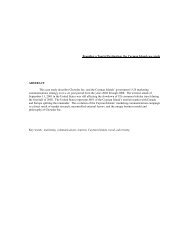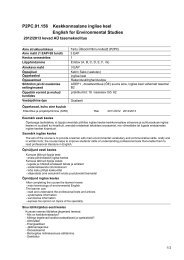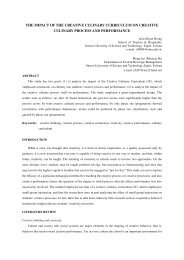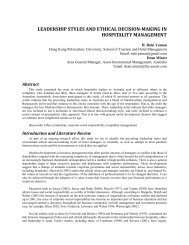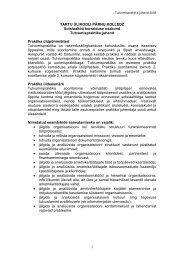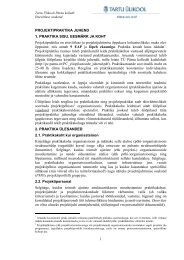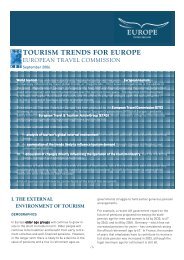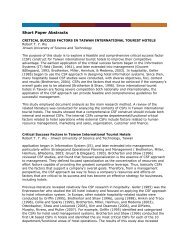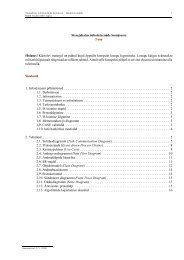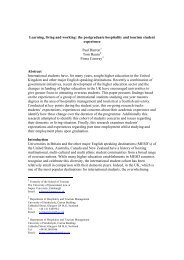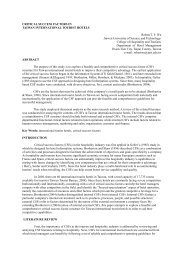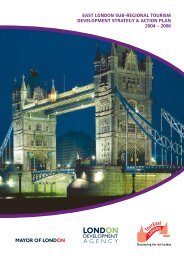- Page 1 and 2:
Health, Wellness and Tourism: healt
- Page 3 and 4:
Acknowledgements TTRA Europe would
- Page 5 and 6:
Kai Illing, Professor, Joanneum, Au
- Page 7 and 8:
ELISABETH IXMEIER Elisabeth Ixmeier
- Page 9 and 10:
Health and Spa Tourism Business: To
- Page 11 and 12:
Literature Review Health and Spa To
- Page 13 and 14:
Yoon & Uysal (2005) stated that pus
- Page 15 and 16:
Push factors Internal motives - phy
- Page 17 and 18:
Respondents were the international
- Page 19 and 20:
Perceptions, learning and attitudes
- Page 21 and 22:
Table 2 Themes of Motivation Factor
- Page 23 and 24:
elaxation as this is generally the
- Page 25 and 26:
Oh, H. C., Uysal, M. and Weaver, P.
- Page 27 and 28:
According to Ajzen, “persuasive c
- Page 29 and 30:
Behavioural Control: Workload Lack
- Page 31 and 32:
A Case Study of Innovative Wellness
- Page 33 and 34:
RP Care is an innovative modular ex
- Page 35 and 36:
The introduction of its modular bus
- Page 37 and 38:
UNDERSTANDING THE IMPACT OF LEISURE
- Page 39 and 40:
development but, three years later,
- Page 41 and 42:
Hamer, D., & Connor, B. (2004).Trav
- Page 43 and 44:
URBAN ZEN - AND HOW TO EXPLORE THIS
- Page 45 and 46:
Health Tourism - The SPA Goers in P
- Page 47 and 48:
Whether we opt for more realistic s
- Page 49 and 50:
focused on the paradigm of wellness
- Page 51 and 52:
immediately followed by specific ho
- Page 53 and 54:
particular reference must be made o
- Page 55 and 56:
Tabbachi, M. (2008), “American an
- Page 57 and 58:
tourism is a lucrative activity for
- Page 59 and 60:
Functional value Functional value i
- Page 61 and 62:
“Before my operation, I did exten
- Page 63 and 64:
The table below recapitulates the m
- Page 65 and 66:
Herrick, D. M. (2007). Medical tour
- Page 67 and 68:
Cosmeceuticals in wellness tourism
- Page 69 and 70:
will replace chemical materials; ad
- Page 71 and 72:
Issues in Co-branding and Co-creati
- Page 73 and 74:
producers of the cosmecuticals to a
- Page 75 and 76:
Lee, C. L. & Decker, R. (2008). A s
- Page 77 and 78:
scheme, although this theoretically
- Page 79 and 80:
study identifying the motivation of
- Page 81 and 82:
highlighted by Folland et al (2001)
- Page 83 and 84:
ackgrounds is expected to accomplis
- Page 85 and 86:
Understanding mature traveller’s
- Page 87 and 88:
attention to the mature travellers
- Page 89 and 90:
Table 1 Travellers’ demographic p
- Page 91 and 92:
• To distinguish spring and spa t
- Page 93 and 94:
Budapest’s thermal spas on screen
- Page 95 and 96:
Budapest as film location The power
- Page 97 and 98:
Usually viewers attach an icon to t
- Page 99 and 100:
In the second part of the questionn
- Page 101 and 102:
Riley R. & Van Doren C. (1992) Movi
- Page 103 and 104:
health as “a state of complete ph
- Page 105 and 106:
how much exercise they get. Two-thi
- Page 107 and 108:
arts, comedy clubs and festivals) w
- Page 109 and 110:
The use of the internet in wellness
- Page 111 and 112:
The main characteristics of Portugu
- Page 113 and 114:
29 Termas de Unhais da Serra 30 Ter
- Page 115 and 116:
ongoing consumer and industry resea
- Page 117 and 118:
Name Table 2. Spa websites analysed
- Page 119 and 120:
more than a handful of links were o
- Page 121 and 122:
Health Spa and Wellness - Competiti
- Page 123 and 124:
The Czech Republic is rich in spas
- Page 125 and 126:
Foreign Exchange Receipts and Expen
- Page 127 and 128:
the total fertility exceeded the va
- Page 129 and 130:
1. Waters - the internal and extern
- Page 131 and 132:
• N - Postoperative and posttraum
- Page 133 and 134:
Foreign guests at accommodation fac
- Page 135 and 136:
Table 6 shows the number of guests
- Page 137 and 138:
M. Zuckerman defines wellness as pr
- Page 139 and 140:
Today´s health spa hotels are most
- Page 141 and 142:
without spa facilities and service
- Page 143 and 144:
Ten Spa Domains. Downloaded from: h
- Page 145 and 146:
customer is value, which at each gi
- Page 147 and 148:
experiences that renew the spirit.
- Page 149 and 150:
eigenvalue 3.668, function 2 explai
- Page 151 and 152:
The results of this study support t
- Page 153 and 154:
Smith M, & Puczko´ L (2009). Healt
- Page 155 and 156: and Bushell (2009, 11) have defined
- Page 157 and 158: listed reasons in more general leve
- Page 159 and 160: One 54 (13.3) Yes 180 (44.3) 2-4 21
- Page 161 and 162: Discussions and Conclusions The aim
- Page 163 and 164: Kelly, C. & Smith, M. (2009). Holis
- Page 165 and 166: While wellness tourism in Australia
- Page 167 and 168: Cairns, which has been suffering fr
- Page 169 and 170: significantly from there, so if the
- Page 171 and 172: Other factors raised by participant
- Page 173 and 174: Connell, J. (2006b). Medical touris
- Page 175 and 176: The Impact of a Festive Event on Re
- Page 177 and 178: The mission of the World Acadian Co
- Page 179 and 180: Table 1 Positive social impacts of
- Page 181 and 182: The Acadians’ quest for pride and
- Page 183 and 184: Ap, J., & Crompton, J. (1998). Deve
- Page 185 and 186: and other characteristics of the ho
- Page 187 and 188: Figure 1). Many of the hotels take
- Page 189 and 190: Target groups As shown in Figure 2,
- Page 191 and 192: to have an influence on these corre
- Page 193 and 194: Purification 11 Application of alte
- Page 195 and 196: Mueller H. and Lanz-Kaufmann E. (20
- Page 197 and 198: The term multidimensional scaling (
- Page 199 and 200: Figure 3 shows the split of bednigh
- Page 201 and 202: Note: Objects: 32. Proximities: 496
- Page 203 and 204: Group one account for 37% of the va
- Page 205: Measurement of Tourism-oriented Asp
- Page 209 and 210: 1999/2000, Table 1. presents the me
- Page 211 and 212: However, according to Table 1, it a
- Page 213 and 214: Since the TSTAR database does not h
- Page 215 and 216: the hundred happiest settlements re
- Page 217 and 218: Managing Cost, Revenue and Yield in
- Page 219 and 220: Method: A Case Study Approach The a
- Page 221 and 222: methodologies, and educational trav
- Page 223 and 224: and times the data was collected, F
- Page 225 and 226: SALA RIES AN D W AGES 18.17% PROFES
- Page 227 and 228: Table 11 Treatment and revenue rate
- Page 229 and 230: Measurement of the Economic Impacts
- Page 231 and 232: o The macro and micro environment r
- Page 233 and 234: Employment impacts During our analy
- Page 235 and 236: • The examined wellness hotels we
- Page 237 and 238: Total number of available beds (acc
- Page 239 and 240: • Our analysis showed that new jo
- Page 241 and 242: City of Budapest is seen as a touri
- Page 243 and 244: of the area will also grow by marke
- Page 245 and 246: of the case studies will be present
- Page 247 and 248: The water is radio-active and conta
- Page 249 and 250: Conclusions In our changing environ
- Page 251 and 252: no exception. Already, patients are
- Page 253 and 254: Data regarding levels of training o
- Page 255 and 256: Figure 2 - Graph showing price will
- Page 257 and 258:
Table 13 - Typical hospital costs f
- Page 259 and 260:
that people willing to pay slightly
- Page 261 and 262:
Continue follow-up care in the UK F
- Page 263 and 264:
HEALTH TOURISM IN IZMIR: POTENTIAL,
- Page 265 and 266:
• Service provided within the ins
- Page 267 and 268:
Table 2 - SWOT Analysis of Health T
- Page 269 and 270:
16. Increasing interest in alternat
- Page 271 and 272:
APPENDIX 1 Interview Questions 1. M
- Page 273 and 274:
point of view it means wholeness as
- Page 275 and 276:
Men Women International Playboy, Me
- Page 277 and 278:
elderly wanted to look like, to act
- Page 279 and 280:
Table 4. The number of experienced
- Page 281 and 282:
emains an open question when the sh
- Page 283 and 284:
Most important criteria when bookin
- Page 285 and 286:
The study investigates the performa
- Page 287 and 288:
The survey was distributed to 400 u
- Page 289 and 290:
Conclusions and Discussion In this
- Page 291 and 292:
A Comparative Analysis of Spa Touri
- Page 293 and 294:
year-long Ottoman occupation: the T
- Page 295 and 296:
although unintentionally, represent
- Page 297 and 298:
separated and I don't like being st
- Page 299 and 300:
Creighton, M. (1997): Consuming Rur
- Page 301 and 302:
Does tourism really contribute to o
- Page 303 and 304:
Africa (mainly Cape Verde, Angola a
- Page 305 and 306:
The theoretical significance of und
- Page 307 and 308:
Veenhoven (2005:61) “quality-of-l
- Page 309 and 310:
Brunt and Courtney (1999). Brunt, P
- Page 311 and 312:
Expectations of Health Tourists in
- Page 313 and 314:
40%). Only those guests were includ
- Page 315 and 316:
accommodation, meals and health off
- Page 317 and 318:
Exploring The Relationship Between
- Page 319 and 320:
proposed at 1975 by Cskiszentmihaly
- Page 321 and 322:
Table 1 Participant information ana
- Page 323 and 324:
Table 3 Well-being analysis result
- Page 325 and 326:
Csikszentmihalyi, M.,(1990), Flow:
- Page 327 and 328:
evident in Ancient Greece and Rome.
- Page 329 and 330:
Resort spas - Sometimes called ‘a
- Page 331 and 332:
analytic model has several methodol
- Page 333 and 334:
From this survey, we selected sever
- Page 335 and 336:
Gulliver in the land of giants? The
- Page 337 and 338:
emergency cases. As the commonly kn
- Page 339 and 340:
Figure 1. The main factors of quali
- Page 341 and 342:
Surgical medical touristic market T
- Page 343 and 344:
• Seamless services: The professi
- Page 345 and 346:
of price-advantage segment. Due to
- Page 347 and 348:
Appendix 1. The characteristics of
- Page 349 and 350:
Appendix 2. The characteristics of
- Page 351 and 352:
Introduction Arguments for the need
- Page 353 and 354:
The DOSTWELL Wellness Quality Seal
- Page 355 and 356:
The statistics obtained from the su
- Page 357 and 358:
Table 1 Sample of the Classificatio
- Page 359 and 360:
Goebel, G., Kapfensteiner, C., Wenz
- Page 361 and 362:
interest activity and health and we
- Page 363 and 364:
performance calls for a unity of wi
- Page 365 and 366:
Table 2 - Learning Commitment Analy
- Page 367 and 368:
higher the tourists satisfaction in
- Page 369 and 370:
supporting factors and resources, d
- Page 371 and 372:
Sustainable Wellness Tourism Destin
- Page 373 and 374:
In tourism marketing Savonlinna has
- Page 375 and 376:
The role and actions of Savonlinna
- Page 377 and 378:
Haaga-Helia (2010). DP in Experienc
- Page 379 and 380:
Hall, M. (2003) Spa and Health Tour
- Page 381 and 382:
excellent capabilities. Despite of
- Page 383 and 384:
Australian Wellness Tourism Provide
- Page 385 and 386:
thrills and excitement which someti
- Page 387 and 388:
The actual responses were compared
- Page 389 and 390:
therapies such as Feldenkrais, acup
- Page 391 and 392:
Table 2: Average Number of Employee
- Page 393 and 394:
As expected, Day Spas and Beauty Sp
- Page 395 and 396:
Snoj & Mumel, 2002). Furthermore, r
- Page 397 and 398:
Cooper, C. P., Fletcher, J., Noble,
- Page 399 and 400:
The Exploration of the Perceived Tr
- Page 401 and 402:
The key question in market segmenta
- Page 403 and 404:
significantly from each other. Ther
- Page 405 and 406:
Table 3 Cross-table of Background o
- Page 407 and 408:
4. Travel benefit perception reflec
- Page 409 and 410:
http://www.oxfordreference.com/view
- Page 411 and 412:
summary or as a commonly accepted b
- Page 413 and 414:
Third, these proxy prototypes were
- Page 415 and 416:
Table 2 Main travel purpose of the
- Page 417 and 418:
Table 4 Non-response shares for des
- Page 419 and 420:
Figure 1 Image positions of five As
- Page 421 and 422:
Figure 2 Image positions of five Eu
- Page 423 and 424:
piecemeal hypothesis and an undiffe
- Page 425 and 426:
Taasci, A.D.A. and Kozak, M. (2006)
- Page 427 and 428:
Among the economic factors determin
- Page 429 and 430:
The demographic profile of the dent
- Page 431 and 432:
The main part of the tourists’ ex
- Page 433 and 434:
Interview II was with the Chief Den
- Page 435 and 436:
anchor point of the dental tourism
- Page 437 and 438:
The country itself could profit muc
- Page 439 and 440:
Appendix



